A deeper look at Peninnah's story in the Bible reveals complexities and cultural pressures that challenge her traditional portrayal.
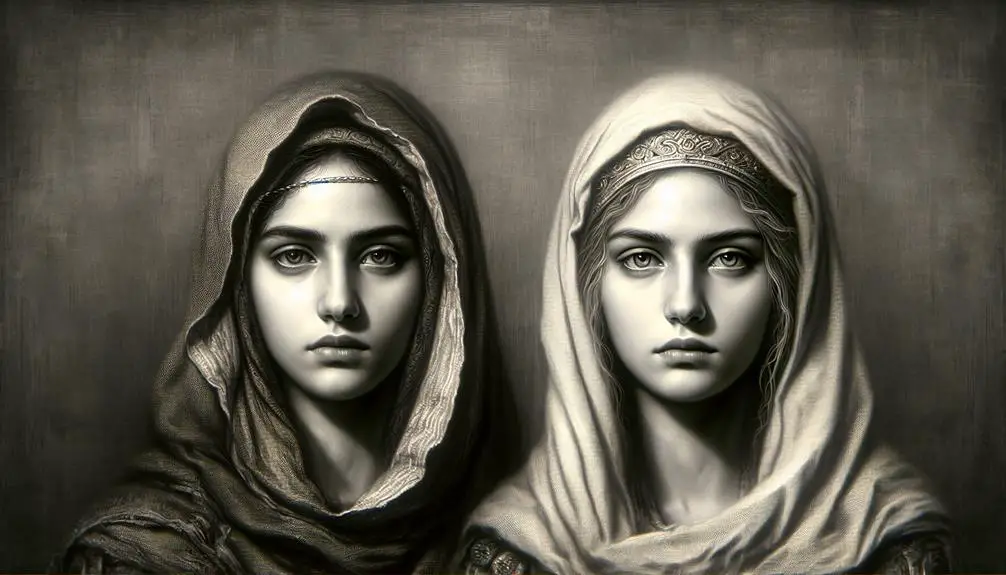
Peninnah in the Bible
As the saying goes, every story has two sides, and the biblical narrative of Peninnah is no exception. You've likely heard of her role in the emotional turmoil of Hannah, but have you considered Peninnah's perspective within the complex dynamics of polygamy and cultural pressures of her time?
Her actions, often seen in a negative light, can be reevaluated to uncover the societal expectations that shaped her behavior. By exploring Peninnah's background and the rivalry with Hannah, you'll discover the cultural context that influenced their lives, hinting at a deeper understanding of her influence on one of the most revered figures in biblical history, Samuel.
What might a closer look at Peninnah's legacy reveal about the narratives we've come to accept?
Key Takeaways
- Peninnah's actions and rivalry with Hannah significantly influenced Samuel's early life and spiritual formation.
- The dynamics of polygamy and societal pressures on women to bear children shaped Peninnah's behavior and family relationships.
- Reevaluating Peninnah's motives offers a deeper understanding of her actions, considering societal expectations and personal insecurities.
- Peninnah's legacy provides insight into the cultural and religious implications of polygamy and women's roles in biblical narratives.
Peninnah's Background
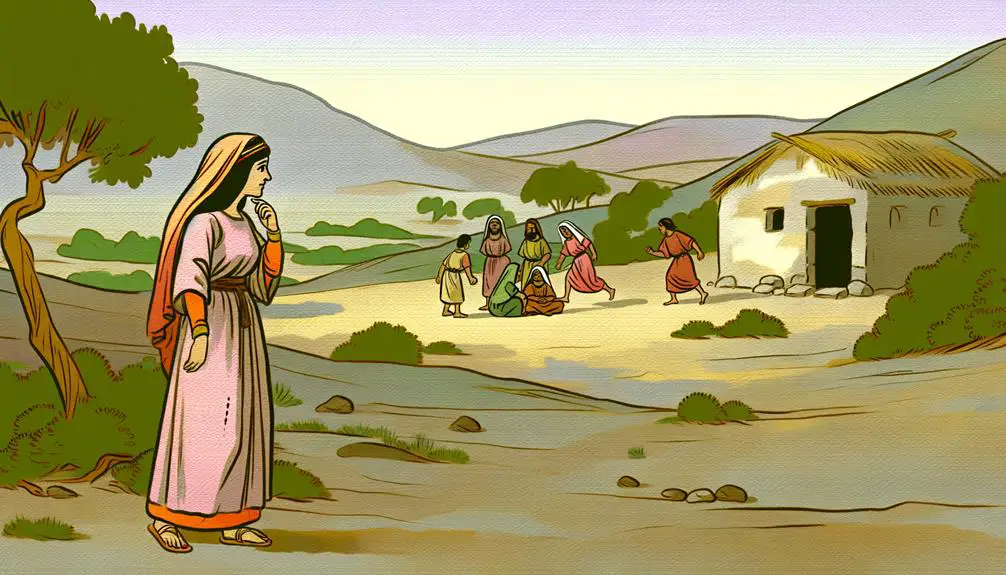
In the biblical narrative, Peninnah emerges as a secondary but pivotal character, whose personal background, though sparsely detailed, plays a significant role in the unfolding drama of the Book of Samuel. Your understanding of her character relies heavily on the nuanced portrayal provided in the scriptures, marked by genealogical ambiguity. This lack of clear lineage complicates your grasp of her overall significance, yet it also adds depth to the narrative by emphasizing her role through actions and interactions rather than heritage.
This genealogical ambiguity serves not just as a narrative device but also as a lens through which you can examine the societal norms and values reflected in the text. It's intriguing to note how the biblical authors choose to define characters through their relationships and roles within stories, rather than their pedigrees, especially in the context of Peninnah's portrayal. Her character is primarily depicted in relation to Elkanah and Hannah, positioning her within a familial drama that highlights the complexities of human emotion and societal expectations.
Your analysis of Peninnah's character portrayal reveals a figure shaped by her circumstances. The sparse details of her background don't diminish her importance but rather underscore the biblical narrative's focus on character dynamics over genealogical precision. This approach allows you to appreciate the subtleties of her character and the broader themes of the Book of Samuel. Through Peninnah, you're invited to explore themes of rivalry, faith, and the human condition, all woven into the fabric of a narrative that values the depth of character over the clarity of lineage.
The Dynamics of Polygamy

Polygamy, often depicted throughout biblical narratives, significantly shapes the interpersonal dynamics within Elkanah's household, highlighting the complexities and emotional tensions inherent in such relationships. As you delve deeper into the story of Peninnah, you're confronted with a world where legal implications and psychological effects of polygamy are woven into the very fabric of daily life. This multi-wife system, while culturally and legally accepted, introduces a range of challenges that impact individuals on both personal and societal levels.
- Legal Implications: Polygamy, sanctioned by the cultural and religious norms of the time, created a legal framework that affected inheritance, familial ties, and social standing. This legal backdrop not only shaped the household dynamics but also influenced the interactions between Peninnah, Hannah, and Elkanah, setting a stage for complex relational tensions.
- Psychological Effects: The emotional and psychological impact on individuals in a polygamous relationship can be profound. Feelings of jealousy, competition, and inadequacy often permeated the household, affecting each member's self-esteem and well-being.
- Societal Expectations: The pressure to conform to societal expectations, such as the importance of bearing children, further exacerbated the emotional strains within the household. These expectations played a pivotal role in shaping the interactions and perceptions of self-worth among the wives.
- Interpersonal Dynamics: The very structure of polygamy fostered an environment ripe for rivalry and emotional conflict. The relationships between Peninnah, Hannah, and Elkanah were inherently influenced by the underlying tension and competition, profoundly affecting the emotional climate of their household.
Understanding these dynamics sheds light on the intricate web of relationships in Elkanah's family, offering insights into the broader implications of polygamy in biblical times.
Peninnah and Hannah's Rivalry
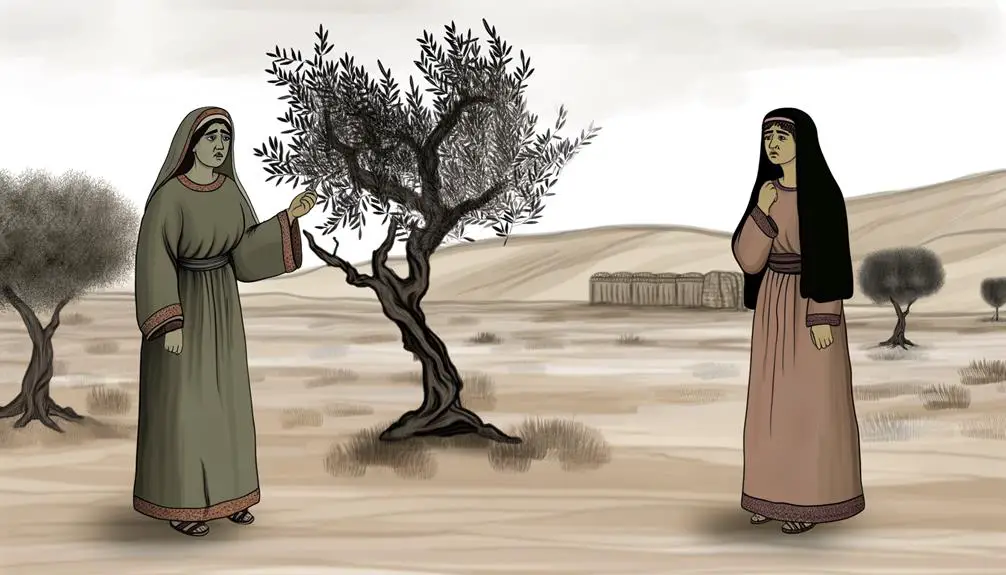
ARTICLE TITLE: Peninnah in the Bible
PREVIOUS SUBTOPIC: 'The Dynamics of Polygamy'
CURRENT SUBTOPIC: 'Peninnah and Hannah's Rivalry'
Delving into the rivalry between Peninnah and Hannah, we uncover a complex layer of emotional and societal pressures that underscore the challenges and intricacies of their relationship within a polygamous household. This sibling rivalry, though not biological, is palpable and laden with emotional impact, reflecting broader themes of competition, jealousy, and the quest for familial favor.
Aspect |
Peninnah |
Hannah |
|---|---|---|
Familial Role |
Mother of children |
Initially childless |
Emotional State |
Insecure, provoking |
Despondent, yearning |
Societal Pressure |
To assert dominance |
To bear children |
This table illustrates the stark differences in their circumstances and the emotional states underpinning their actions. Peninnah, secure in her role as a mother yet insecure, possibly due to Elkanah's favoritism towards Hannah, resorts to provocation. Hannah, on the other hand, experiences deep yearning and despondency, accentuated by her childlessness and Peninnah's provocations.
The emotional impact of this rivalry is profound. For Peninnah, it might stem from a desire to solidify her place within the household, driven by societal expectations and personal insecurities. Hannah's pain, conversely, is twofold: it arises both from her inability to conceive and from the constant reminders of this fact through Peninnah's actions. This dynamic, while deeply personal, also mirrors the societal pressures and expectations placed on women in their cultural context, though the latter is a discussion for another time.
In analyzing their rivalry, it's clear that these emotional and societal pressures intertwine, creating a complex web of interactions that define and complicate their relationship.
Cultural Context and Pressures
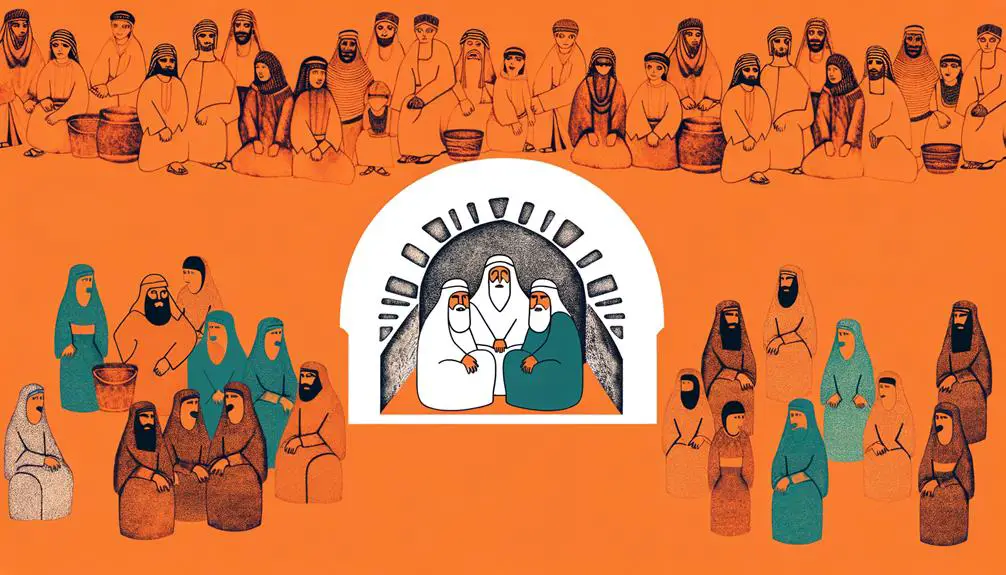
Understanding the cultural context and pressures faced by Peninnah and Hannah sheds light on the deeper complexities of their rivalry and the societal norms of their time. Their story, deeply embedded in the fabric of ancient societal structures, offers a lens through which to examine the pervasive social norms and familial expectations that shaped their lives and actions.
- Childbearing as a Measure of Worth: In their society, a woman's value was significantly tied to her ability to bear children. This expectation created a fertile ground for rivalry, particularly in polygamous households where multiple wives vied for status and validation through motherhood.
- Polygamy and Familial Dynamics: The practice of polygamy, though culturally accepted, often led to intense emotional and psychological pressures within the household. Each wife's status could fluctuate based on her ability to produce heirs, further complicating familial relationships.
- Social Status and Identity: Social norms dictated that women's identities were largely constructed around their roles within the family. Lack of offspring not only affected a woman's status within her household but also her standing in the wider community.
- Familial Expectations and Legacies: The pressure to contribute to the family lineage by bearing children was immense. This expectation wasn't just a personal desire but a familial duty, with significant implications for a family's social and economic legacy.
These elements combined to create a highly charged environment where Peninnah and Hannah's interactions weren't merely personal but deeply entwined with the expectations and norms of their culture. Understanding these pressures helps to contextualize their rivalry beyond mere jealousy, highlighting the broader societal structures at play.
Peninnah's Influence on Samuel

Despite her indirect role, Peninnah's actions significantly shaped Samuel's early environment, influencing his development and future path. You mightn't initially see the connection, given Peninnah's more direct interactions were with Hannah, Samuel's mother. However, the familial dynamics, marked by Peninnah's contentious relationship with Hannah, played a pivotal role in Samuel's early life. This environment, characterized by rivalry and Hannah's deep desire for a child, indirectly fostered Samuel's resilience. Observing his mother's faith and perseverance in the face of adversity likely instilled in him a strong sense of purpose and determination.
Moreover, Peninnah's role in this narrative contributed to the circumstances leading to Samuel's spiritual upbringing. It was Hannah's vow, made in response to her situation, including her interactions with Peninnah, that dedicated Samuel to a life of service to God. Thus, Peninnah's presence and actions, albeit indirectly, were instrumental in setting Samuel on his path of spiritual leadership. This unique upbringing, away from his biological family and in the temple under Eli's mentorship, further cultivated his resilience and deepened his spiritual insights.
Analyzing Peninnah's influence on Samuel's life, it's clear that her impact goes beyond mere familial strife. Her actions, while not directly nurturing, contributed to the environment that shaped Samuel's character and destiny. This perspective allows you to appreciate the complexity of relationships and their unintended consequences, showcasing how even adversarial interactions can contribute to one's spiritual and personal growth.
Reevaluating Peninnah's Legacy
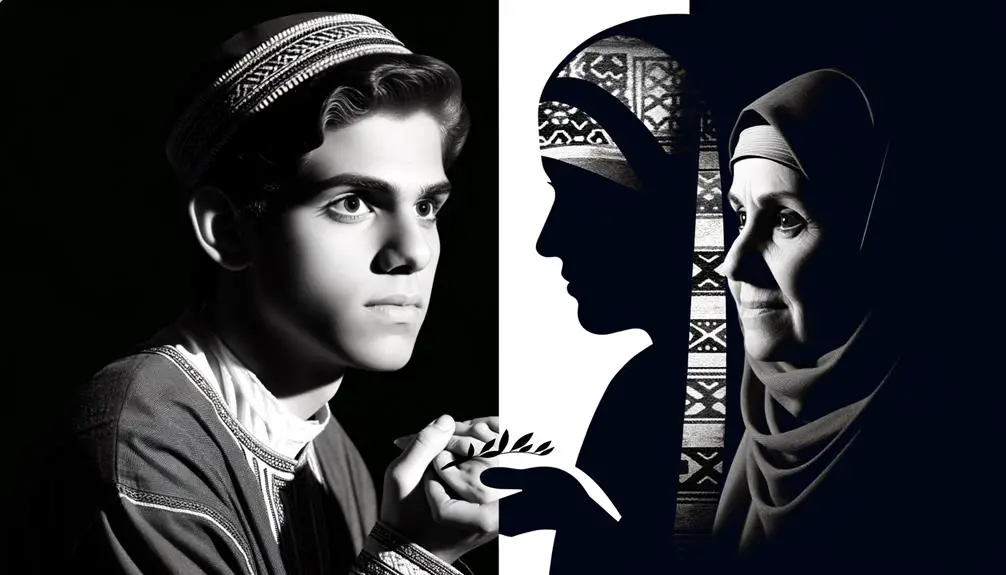
You must consider Peninnah's motives within her socio-cultural milieu to grasp her complex role.
An examination of the cultural context she inhabited sheds light on her actions and decisions.
This reevaluation offers fresh insights into her legacy, challenging traditional interpretations.
Peninnah's Motivations Explored
To reevaluate Peninnah's legacy, it's essential to delve into the motivations behind her actions as depicted in the biblical narrative. Psychological analysis and character development provide critical lenses through which we can better understand her complexities.
- Insecurity: Perhaps driven by her own insecurities, feeling overshadowed by Hannah's favored status.
- Desire for Recognition: Seeking acknowledgment and validation from her husband, Elkanah, in a culture that prized fertility.
- Social Pressure: The societal expectations to bear children might've intensified her actions towards Hannah.
- Personal Struggle: Her behavior could reflect her own internal battles and frustrations.
This analytical approach sheds light on Peninnah beyond her traditional portrayal, suggesting motivations rooted in human vulnerability and societal pressures, rather than mere malice.
Cultural Context Considered
Understanding Peninnah's actions requires a careful examination of the cultural context in which she lived, emphasizing the significant influence of societal norms and expectations on individual behavior. Her story unfolds in a time where religious roles and social hierarchy deeply impacted everyday life, shaping personalities and destinies.
Aspect |
Influence on Peninnah |
Broader Impact |
|---|---|---|
Religious Roles |
Defined her identity and purpose |
Dictated social standing |
Social Hierarchy |
Positioned her within her family |
Influenced interpersonal dynamics |
Societal Expectations |
Pressured her into competitive behavior |
Affected personal relationships |
This table highlights the intertwining of personal motivations with the societal structures of her time, suggesting a complex interplay between individual actions and the broader cultural settings. Analyzing Peninnah through this lens invites a more nuanced understanding of her character and her legacy within biblical narratives.
Legacy Reinterpretation Insights
Reevaluating Peninnah's legacy demands a critical analysis of her actions and motivations within the complex framework of her societal and cultural context. By delving into her story, you uncover modern parallels that offer a deeper understanding of her character, fostering empathy and a nuanced perspective.
- Modern parallels: Identifying contemporary situations akin to Peninnah's can illuminate the pressures and challenges she faced.
- Character empathy: Approaching her narrative with empathy allows for a more compassionate understanding of her actions.
- Societal constraints: Recognizing the societal norms that influenced Peninnah's behavior is crucial.
- Cultural context: Considering the cultural backdrop of her time provides insight into her motivations and decisions.
This analytical approach encourages a reevaluation that appreciates the complexity of Peninnah's character and her circumstances.
Frequently Asked Questions
How Did Peninnah's Treatment of Hannah Reflect the Broader Societal Norms Regarding Women's Worth and Fertility in Ancient Times?
Your question touches on how fertility stigma and social hierarchy influenced women's worth in ancient times.
Fertility was a key determinant of a woman's value, deeply ingrained in societal norms.
The treatment you're curious about showcases the pressures and disdain faced by women struggling with fertility issues.
This reflects broader societal views that prioritized reproductive success, positioning it as a crucial aspect of women's identity and worth within the social hierarchy.
Are There Any Jewish or Christian Traditions That View Peninnah in a More Positive or Rehabilitative Light, Beyond Her Role as Hannah's Adversary?
Every coin has two sides, and in exploring Peninnah's redemption, you'll find that certain Jewish and Christian traditions indeed cast her in a more favorable light. These spiritual interpretations delve deep, suggesting her actions might've propelled Hannah towards her destiny, serving a divine purpose.
Analyzing these narratives, it becomes clear that they seek to offer a broader understanding of her character, beyond merely being an adversary, showing a more complex and rehabilitative portrayal.
How Has Peninnah Been Depicted in Religious Art or Literature Outside of the Biblical Text, and What Do These Portrayals Suggest About Her Character?
When exploring how characters are depicted outside their original narratives, you'll find artistic symbolism and literary adaptations offer deep insights.
For Peninnah, these portrayals vary, but often they delve into her complexity beyond surface-level antagonism. Art and literature reframe her, sometimes highlighting her struggles or motivations.
This broader perspective suggests a character with depth and humanity, challenging simplistic interpretations and inviting a more nuanced understanding of her role and actions.
What Psychological Insights Can We Gain From Peninnah's Behavior Towards Hannah, Considering the Context of Polygamous Competition and Societal Pressures?
You're diving into the psychology of rivalry and emotional manipulation within competitive relationships.
By examining behaviors in such dynamics, you'll uncover insights into how societal pressures and the desire for superiority fuel these interactions.
This analysis sheds light on the complexities of sibling rivalry, revealing how emotional manipulation is often a tool used to assert dominance.
It's a reflection of deeper insecurities and societal expectations, highlighting the psychological toll of competition.
In Modern Interpretations or Retellings of the Story, How Is Peninnah's Character Explored or Reimagined in Light of Contemporary Values and Understanding of Family Dynamics?
In modern retellings, you'll find Peninnah's character deeply explored through contemporary values. Reimagined narratives often inject modern empathy into her story, highlighting the complexities of family dynamics absent from the original text.
These interpretations seek to understand her actions beyond mere jealousy, delving into the psychological and societal pressures she faced. This approach allows you to see her in a new light, reflecting broader understandings of human behavior and relationships.
Conclusion
Ironically, Peninnah, often cast in the shadow of Hannah's piety and motherhood, plays a pivotal role in the biblical narrative. Through her rivalry, she inadvertently propels Hannah into fervent prayer, leading to Samuel's birth, who becomes a key figure in Israel's history.
It's a classic case of unintended consequences, where Peninnah's antagonism serves a divine purpose. This reevaluation of Peninnah's legacy challenges us to look beyond surface interpretations, acknowledging the complexity of biblical characters and their contributions, however indirect, to the unfolding of Israel's story.



Sign up